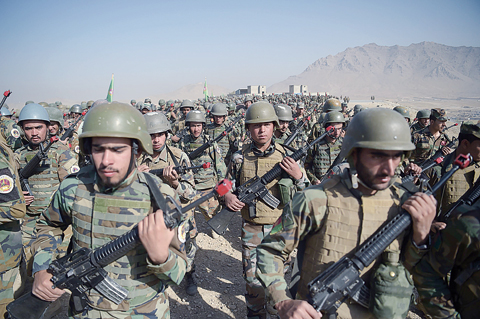MAZAR-I-SHARIF: More than 150 Islamic State fighters surrendered in Afghanistan yesterday, Afghan officials said, a move which they and the Taleban hailed as the end of the extremist group in the northern part of the country. The apparent IS capitulation comes after weeks of intense fighting with the Taleban in Jowzjan province in the north, and ongoing pressure from Afghan and US forces. "Their fighters have surrendered in the past, but this time it is more important because the Daesh leader and deputy surrendered with more than 150 fighters all at once," Mohammad Hanif Rezaee, spokesman for the 209 army corps in the north, told AFP.
Rezaee said 30 women and children had also handed themselves in to Afghan authorities. "With this the Daesh chapter is going to be closed in the north," he added, using the Arabic acronym for IS. IS has a relatively small but potent presence in Afghanistan, mainly in the eastern province of Nangarhar, but more recently in Jowzjan. The group has fought turf wars with the much larger Taleban since emerging in in Afghanistan in 2014. Estimates on their numbers in the country run as high as around 2,000.
Until a few weeks ago there had been around 500 IS fighters in Darzab and Qush Tepa districts of Jowzjan, provincial governor Lutfullah Azizi has said. But the Taleban stepped up fighting with the group there after an IS attack on their fighters last month killed at least 15 people, Azizi said. The Taleban took credit for the surrender announced by Afghan officials on Wednesday, saying it had "cleared" the north of IS fighters. It claimed it had captured 130, wounded more than 100, and killed 153.
The development comes as the Afghan army took over security in the eastern city of Jalalabad in IS's main stronghold of Nangarhar province after a spate of attacks, mostly claimed by the group. More checkpoints have also been set up and special forces are conducting operations after militants stormed a government office in the city on Tuesday, killing 15 people. No group has yet claimed responsibility for the attack, but IS is widely suspected of carrying it out. "To provide better security for the people, the national army is leading the security in the city," Attaullah Khogyani, spokesman for the governor of Nangarhar province, told AFP. "Police and other security forces are supporting them."
Under the new security plan, the army would lead efforts "to contain the emergency situation" for a week, Khogyani said, declining to provide details. Eventually, police and soldiers "will join hands to secure the city", he added. "IS has come under intense pressure from the government and the Taleban. They have lost a lot of men," former general Hadi Khalid, now a military analyst, told AFP. "The only strategy that can keep them going is to attack soft targets and that is what they have been doing recently." -- AFP










